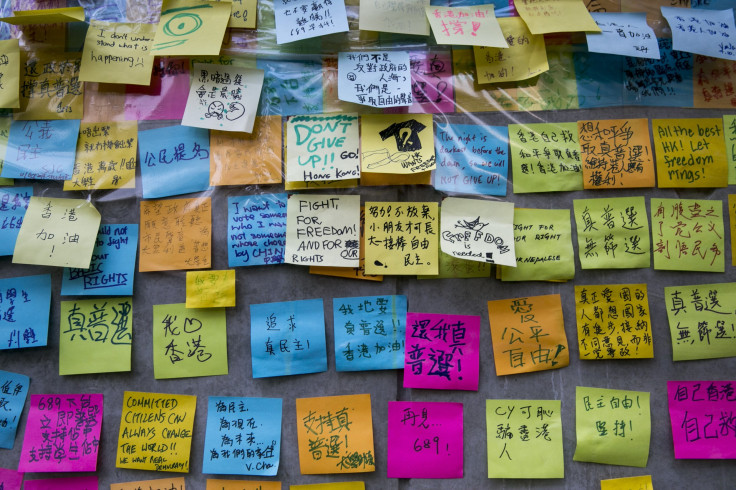Hong Kong Protests 2014: The Umbrella Revolution Will Not End On The Streets

HONG KONG – Uncertainty over Hong Kong’s ongoing pro-democracy protests lingers as the city emerges from one of its most dramatic weeks in recent memory. But, even as tempers continue to flare on the streets, members of the protest movement are also looking at the tough political tug-of-war with the government that lies ahead.
Government officials have been wrestling with the Hong Kong Federation of Students activist group in recent days to sort out conditions for negotiating a resolution to the impasse over the street demonstrations. Many protesters insist that the government is responsible for making the next move, and that its actions will affect how long the road blockades continue. The drama may continue to play out in the street, but many pro-democracy supporters understand that this is only the beginning of a long, hard process.
“The road blocking has an end, but the whole movement will not end in a short period,” said protester Tammy Liu, 35. “Because what we want is far too different from what the Chinese government thinks we can have.”
Liu said that as the quest for universal suffrage has galvanized more people, diverging views and strategies may ultimately weaken the continuing street occupation.
“Everybody thinks differently,” she said. “Some people will want the government to agree with them [completely] before ending the blockade. And some will think if the government comes out to talk to us, it’s sincere.”
Three major activist groups have been vocal participants of the week-long demonstrations: Occupy Central With Love and Peace, a civil disobedience campaign spearheaded by university academics; Scholarism, a group started by high school students; and the Hong Kong Federation of Students, a large student union.
But the movement is leaderless, by and large, making it less clear what kind of an agreement might satisfy all demonstrators if Hong Kong’s government fails to grant universal suffrage for the 2017 election.
“Both sides have to give some room for each other to step down," said Cheung-Fung Fan, a 25-year-old trade union organizer. “The final resolution may not be perfect, but I hope both sides will keep a negotiable attitude. I just worry that the government will be too rigid.”
Others say that no matter how the street blockades are resolved, the pro-democracy movement has already ignited a political flame throughout Hong Kong.
“I think we’ve hit our highest numbers, unless the Hong Kong government does another stupid thing,” said Catherine Cheng, 21. “But to me, just like Occupy Wall Street, no matter what the result is, this movement has really gotten people more and more aware of what Hong Kong people can do for their future. To me, the definition of this movement is success already.”
Liu said that the movement "may not be as strong, but I think it’s deeper,” adding: “Because everyone’s heart is shaken. And some people that never thought of this political stuff before, now they’re starting to pay attention and think more. Now it’s deep down in everybody’s heart.”
© Copyright IBTimes 2024. All rights reserved.






















